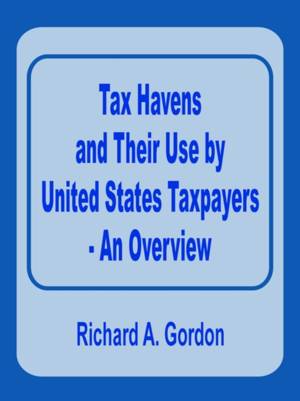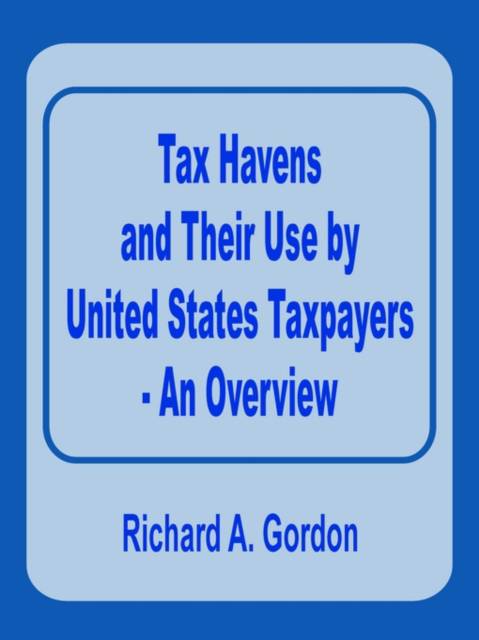
- Afhalen na 1 uur in een winkel met voorraad
- Gratis thuislevering in België vanaf € 30
- Ruim aanbod met 7 miljoen producten
- Afhalen na 1 uur in een winkel met voorraad
- Gratis thuislevering in België vanaf € 30
- Ruim aanbod met 7 miljoen producten
Zoeken
Tax Havens and Their Use by United States Taxpayers - An Overview
Richard A Gordon
Paperback | Engels
€ 27,45
+ 54 punten
Omschrijving
This book was written at the request of the Commissioner of Internal Revenue, The Assistant Attorney General (Tax Division), and the Assistant Secretary of the Treasury (Tax Policy).The purpose of this book was to develop an overview of tax havens and the use of tax havens by United States taxpayers. The study sought to determine the frequency and nature of tax haven transactions, identify specific types of tax haven transactions, obtain a description of the United States and foreign legal and regulatory environment in which tax haven transactions are conducted, describe Internal Revenue Service and Justice Department efforts to deal with tax haven related transactions, and to identify interagency coordination problems.The findings are based on a review of judicial decisions and published literature in the field of international tax planning, research into internal IRS documents concerning taxpayer activities, interviews with IRS personnel, personnel who deal with tax haven issues for other Federal government agencies, and lawyers and certified public accountants who specialize in international taxation. The findings are also based on a statistical analysis of available data concerning international banking, United States direct investment abroad, and foreign investment in the United States. While the findings did not uncover all the methods employed to use tax havens, the belief is that the inquiry was extensive enough to give an understanding of the situation and to enable the IRS to develop options which might be useful in improving the administration of the tax laws as they apply to tax havens
Specificaties
Betrokkenen
- Auteur(s):
- Uitgeverij:
Inhoud
- Aantal bladzijden:
- 276
- Taal:
- Engels
Eigenschappen
- Productcode (EAN):
- 9780894991370
- Verschijningsdatum:
- 5/09/2002
- Uitvoering:
- Paperback
- Formaat:
- Trade paperback (VS)
- Afmetingen:
- 210 mm x 279 mm
- Gewicht:
- 625 g

Alleen bij Standaard Boekhandel
+ 54 punten op je klantenkaart van Standaard Boekhandel
Beoordelingen
We publiceren alleen reviews die voldoen aan de voorwaarden voor reviews. Bekijk onze voorwaarden voor reviews.











